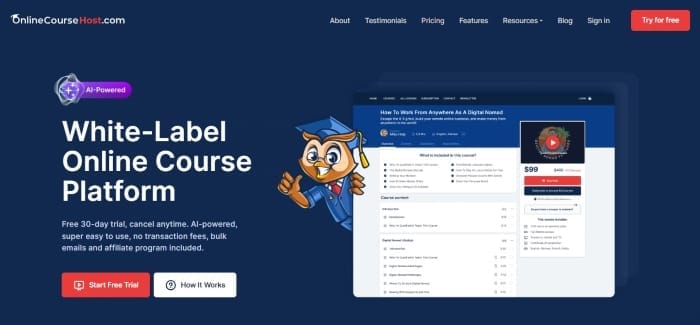How To Create a Personal Brand For Your Online Courses (Ultimate Guide)
 Platform Review
Platform Review

Learn how to create a strong personal brand, and why it is not only important to help you create a more successful online course business, but also essential nowadays due to SEO (Search Engine Optimization) reasons.
How do you create a personal brand for your online course? That's the question we'll answer together in this guide.
In the world of online education, standing out is key. But how do you make your courses memorable among the sea of options?
The answer lies in creating a personal brand.
Being a great online teacher isn't always enough. A personal brand adds a touch of authenticity, making your expertise memorable and your teachings impactful.
So, whether you're starting or giving your brand a makeover, this guide is your step-by-step guide to success.
I'll show you how to create a personal brand for your online course. I'll also cover everything from defining what makes you special to crafting your story and using platforms to boost your online presence, ensuring your courses leave a lasting impression.
This post is part of a series of free in-depth guides on all topics related to online course creation.
You can always find an up-to-date index with all the free content available in the Course Creator Academy by clicking on the Academy link on the top menu bar.
How to Build a Personal Brand for Your Online Course
This is happening. Whether you like it or not, you are already building a personal brand.
Actually, you’ve done so from the beginning, without even noticing.
Each time you publish a new course, write a blog post, show up on social media… you reinforce this brand.
For better or for worse, it’s happening.
So surely it’s more logical to take control of this and consciously build the right personal brand, right?
Benefits of having a strong personal brand as a course creator
After all, the benefits of a strong and relevant personal brand are huge and very beneficial for your online course business:
- A personal brand makes your products and services instantly recognizable online, as there is nothing more recognizable and easy to remember than a human face
- People relate much better to other people than to brands, so being a personal brand is a huge competitive advantage compared to a company brand
- A personal brand helps you nurture your audience and build their trust over time
- A personal brand creates credibility, authority, and an improved reputation
- It also ensures you remain top of mind, making you the go-to educator in your specific course niche
- Attracts new people to you and your courses (through referrals and word of mouth)
Competition is tough. And it’s growing tougher by the day. You need to stand out and you need to do so for the right reasons.
Your personal brand is the secret to this!
How To Determine Your Personal Brand
Before we get into how to build a personal brand as a course creator, it’s important you appreciate something: this is about you.
Do not try to copy someone else.
Do not follow the blueprint somebody else offers.
Do not try to replicate another person’s journey to success.
Take inspiration, sure. But don’t try a copy and paste method. This is about you.
This is about what you bring to the table to your audience.
Personal Branding Tutorial (6 Proven Steps To Follow)
Okay, now you appreciate this is about you and only you, you’re ready for the how to do this part.

1: Audience Research
This step is absolutely crucial. This is one of the key critical steps that determine if your online course business will succeed or fail in the long run, and it is so easy to overlook this step or rush through it.
First, we need to start with you. Take some time to get clear on:
- Who your audience is
- What are your audience's pains, fears and desires
- who your competitors are
- Your UVP (Unique Value Proposition)
If you deconstruct the success of your personal brand to its simplest form, it involves aligning you, your offer, and your audience.
Yet this is easier said than done. After all, you may think you know you, your offer and your audience… but do you?
Can you describe each in detail right now? If you’re like most people I speak to, probably not. 😉
Most of all, this initial research step is about your audience, and how you can relate to them on a human level.
You need to get clear on your ideal student, and to find this out, you can't do it alone.
Sure, you can have a good initial idea, but in order to do this step right, you need to jump into forums like Reddit, Facebook Groups, Twitter, or wherever else your audience gathers.
You need to not only read their posts and questions on a daily basis, but you also need to join in the conversation. Ask questions, give answers, and even interact with your audience on a one-on-one basis via private messaging.
After 20 or 30 of these direct interactions, you will have a much better picture of who your ideal student is and what they are looking for to learn.
Why you might not really know what your audience needs
You, as an expert on the topic that you teach, might think you know what they are looking for, but you might be too far removed from the difficulties of a beginner to be able to tell that clearly.
So it is essential that you let your audience tell you what they need, not the other way around. 😉
Audience research affects everything
This deep understanding of your audience will help you craft a message that will resonate with them everywhere: in your course sales pages, in your educational emails, in your social media posts, etc.
Without this, your content will not grab your audience's attention. You need to understand your student's fears, you need to know the myths and misconceptions that they believe in and help them dispel them if necessary.
This means that you should connect yourself to online forums where your students gather on a daily basis and be a very active participants. This is an ongoing process that really never ends, but you should dedicate more time to it, especially in the beginning.
If you are just getting started creating online courses, I recommend setting aside maybe one hour a day or more for this crucial task, which will be the foundation for everything else that you do next.

2: Craft Your Personal Brand Story
The second step of creating a personal brand is to craft a compelling personal story that will resonate and capture the attention of your target audience.
People want to know who you are, and what makes you tick, they want to get to know you as a person before they trust you.
What’s your story? What journey have you been on? Recently, of course, but also even way back when you were a kid…
For example, here are some posts where I have presented my own personal story:
- A summary of my online course creator career: How I Made $1.615.000 Selling Online Courses (So Far)
- My company OnlineCourseHost.com About Page
You have a story, and it’s way more important than you think.
After all, it's the story of what led you to this point where you have decided to dedicate your professional life to helping your audience, right?
So even if you feel like you’ve lived an uninspiring or uninteresting life. I assure you, you haven’t!
As people, we’re attracted to stories. Long before books (and long before the internet), we passed on information through stories.
In many ways, it’s storytelling that makes us human.
Never underestimate this. Don’t devalue your story. It’s unique to you, and it's highly relatable to many other people in your industry that might have similar stories, or feel inspired by your story.
So, again… what’s your story?
Take time to reflect on this, write it down, and refine it. But here’s the important part: it actually isn’t about you. Not really.
You may play the lead character, but the premise of your story needs to center around your students; who they are, and what their pain is.
Frame their problems as the ones you faced, and how you overcame them.
Use your journey to prove to them that changes are possible for them too!

3: Optimize Your Personal Brand For SEO
Now that you know who you are, what you bring to the table, and who you can help (and have a story that ties all this together), you need to create your online presence in the right way.
In today’s multi-faceted world, this might mean:
- Personal Website
- Course Website(s)
- Social Media
- to name a few…
It’s not just about building these but optimizing them. Take your website, for instance. You need to build it in a way that both speaks to your audience and plays nicely with Google (and other search engines).
This is important. You need to optimize everything you create online. For both people and algorithms.
People because this is the whole point of your personal brand.
Algorithms because these are the gatekeepers between you and those all-important people! 😉
Why is Personal Branding Essential for SEO?
So what does personal branding have to do with SEO (search engine optimization)?
Isn't a personal brand all about people? And search engines are just computer algorithms, right?
For several years now, major search engines such as Google put a very big emphasis on making sure that all the content they show to their users is reliable and serves their user's best interests.
For that, Google considers absolutely essential to be able to identify the individual author of each and every piece of content that they show their users and know exactly who the author is.
And this includes you, your online courses and anything else that you post online, including course sales pages and other course promotional material.
This means that if you don't want your online course website to be penalized by search engines, you need to make sure that both Google and humans know exactly who the owner of the website is, but also who is the author of any single piece of individual content, like a web page or a blog post.
The course creator should be clearly identified on every course sales page, and each author should have a separate About page or at least a section on the course page explaining why they are qualified to talk about the topics covered in their courses.
This process of identifying the course creator and establishing their credibility is known in search engine terms as EAT - Expertise, Authoritativeness, and Trustworthiness.
What is Search Engine EAT?
EAT is all about checking who the author is, evaluating the author's authority and using that as a ranking factor to determine if the author's content should be shown to search engine users or not.
You can read more about this concept in the original article where Google presented EAT.
EAT will be more important for certain industries than others. For example, for everything related to medical, financial, and legal information, EAT is extremely important.
Google will probably not show your posts about personal finance or medical information if you are not a professional in the field, clearly identified via social media profiles and public links from your university students page, or other trustworthy online directories of accredited professionals in the field.
This is normal because Google and other companies don't want to be considered legally responsible if they accidentally show you for example wrong medical or legal information that might impact you negatively, like get you sued or gravelly sick for example.
EAT is essential to protect both you as a search engine user from wrong and misleading information and the search engine companies from the legal consequences of spreading harmful or misleading information.
But if you are not in the medical or legal field, you might think that this does not apply to you and your courses.
Does Search Engine EAT apply to you?
Even if you are not in the medical, financial, or legal field, there are many other areas of activity where Google considers it essential to know who the person behind any commercial website is, and this includes online course websites.
This includes in general anything that might be considered "Your Money Your Life" pages (YMYL for short).
These are pages that contain crucial information that might affect your well-being or financial safety.
And if you are selling a product online like an online course, and you are asking for people's credit cards for payments, search engines can very well consider that they need to establish the EAT of the course creator before showing the page to your students.
Even if you are selling a course on how to play chess or tennis, you are still asking for people's credit cards, right? So that might impact people from a financial standpoint, as some courses are sold for thousands of dollars.
So even if what you are teaching is a non-critical subject, Google still wants to know exactly who owns the website, if there is a contact page, and if the author of the page is trustworthy or not and knows well the topic.
So as you can see, identifying yourself clearly as a reliable content author in your field is essential and helpful not only for converting your page visitors into paying students but also to help you rank better in search engines and get more traffic.
So how do you establish EAT and create a trustworthy personal brand from the perspective of a search engine?
SEO Tips for Personal Branding
To get search engines to trust you as much as possible and gain consideration for having organic traffic, you need to follow the following steps.
For example, it's absolutely essential that you have an About page, where you will present your story and identify yourself as an author or course creator.
You need to link from there to any social media profiles like Linkedin, Facebook, etc., and from those profiles back to your website.
You should link from public profiles on social media, these profiles should be reachable from search engines so they really need to be public otherwise this won't work.
If you have access to your University student's page, you want to link back to your website or mention it in the Bio.
If there is an online directory of professionals in your field that you can get listed on, you should do so and link back to your website.
You should update all your social media profiles with the same picture of you (avatars won't do, your actual face must be visible), and you should update the text in each bio to talk about your current activity, and link back to your website wherever possible, or at least mention it in the text.
It's true that these links won't count as referrals because they are user-generated content (no-follow links).
But they will still help the search engine to determine that this is really the same person, link your content to you, and assign you a given level of authority in your field.
Besides updating all your profiles and linking them together, when you purchased your web domain you were given the option of making it anonymous, and not listing your name in the global Who Is directory of websites.
If you did choose this option, you need to go back and disable it because this anonymity is harmful for SEO. You need to be clearly identified in a public way that you are the owner of your website.
How do I know that my EAT is OK?
Let's say that you went through this process and updated all your profiles, wrote your story, and published all your About and Author Profile pages on your website.
Give it about a month, and do a Google Search on your name, and see what shows up. If you did everything correctly, your website and your About page should show up in the top results.
These principles should be followed not only in your website but also anywhere else where you publish content.
I’ve created several resources to help you optimize your online presence:
- How To Write A High-Converting Online Course Description
- How To Create The Perfect Online Course Sales Page
- How To Create A Compelling Online Course That Your Students Will Love
And trust me, Kevin Costner lied to you. 😉
Build it and they won’t come.
You need to optimize what you build and continue to do this. After all, the algorithms change. So do you students. What works today may not work tomorrow.
Keep this in mind as you build one online page after another, and optimize it for both humans and robots.
Now that we understand how your personal brand might affect your SEO online presence, what else is needed for building a strong personal brand?

4: Nurture a Community (Facebook Group)
There are other forums online besides Facebook, and if your community prefers those, you should use them.
Independently of the platform, what is important is to create your own community, wherever that might be.
But Facebook is the largest social media platform right now, so there is a very good chance that your audience will hang out there on a daily basis.
Could a Facebook Group be your most important online presence? Maybe…
Many assume it’s a personal website or the sites you create for your courses.
Don’t get me wrong, these are important. Very important! Yet a website does little to continuously build trust for you as an author and content creator.
It also does little for engagement.
But that’s where social media comes in.
Yet social media as a whole is a far-too-large ocean.
But there’s something that exists inside these that has changed how you can play the game: Facebook Groups, and especially private groups.
Here’s mine, for example, the Course Creators Academy. This is a private group and you need to apply and answer certain questions before getting in:
If you’d like to be part of an ever-growing community of course creators, feel free to join us and ask any questions you need about course creation.
This community has changed things for me. It not only connects me to a relevant and engaged group of people, but it’s also an amazing place for research—so I can better get to know who my audience is.
I do this on a daily basis, and it helps me tremendously to continuously refine my message, and help me better understand what course creators really need in a platform, and what type of content they are looking for.
Chances are, you too can benefit from a Facebook Group like this. I’ve written about how to create a Facebook Group here:
Why build your own community?
Make no mistake, having your own community is a game-changer, especially on Facebook!
And this is because:
- It showcases you as an authority and expert
- Places you in front of an engaged and relevant audience
- Allows you to indirectly promote your courses (and other offers)
- Builds a direct connection between you and your audience!
Much of this process comes down to building trust. It’s hard to do nowadays because there’s so much competition and choice!
Standing out is hard, but a group like this just breaks down barriers and gets you closer to your audience.

5: Build a Content Strategy
As a course creator, your content defines much of your success. But the course content you create only tells part of the story. There’s so much more that goes into your personal brand.
- Social media
- Blogging
- Videos
- Podcasts
- Guest posts/features
- Interviews (on podcasts, YouTube channels, etc…)
- Webinars and other partnerships/collaborations
Creating content is easier than ever. There’s literally nothing standing in your way. This is both positive and negative. Because you’re not the only one creating content. Everyone else is too.
The good news… the bar is set low.
Most people create content for the sake of it.
So if you come up with a plan (or strategy), you set yourself apart. It’s one of the most underrated aspects when building a personal brand. People forget there’s a difference between content and relevant content.
That’s the key here… relevance.
You need to craft content your audience really needs.
- Content that solves their problem!
- Content that captures their attention.
- Content that keeps their attention.
Maybe this centers around video… audio… long, in-depth articles/guides… or short and sweet blog posts.
Maybe Instagram is the platform for you. Then again, maybe it’s Linkedin.
That’s the point. The right content strategy for you differs from mine and everyone else. What you need to do is hone in on:
- The type of content you excel at
- The type of content your audience needs
By aligning these two points, you succeed. If you don’t, you come across like everyone else.
But don’t only get caught up in your own platforms (your blog, your YouTube channel, your social media platforms…). All these play an important role in your personal brand, as we’ve already discussed.
But there’s a whole world out there; other people with established audiences you can help.
- Guest posts
- Interviews
- Feature articles
- Joint webinars/masterclasses
- Social media tours…
Be open to it all. But always bring it back to relevance.
If it’s relevant, great. If not, move on.

6: Repurpose Your Content
Let’s shine a light on something else far too many course creators overlook when it comes to content. Because as a course creator, you are a content-building machine.
You have course material. Workbooks. Training exercises. PDFs. Interactive resources. Videos!!
Just because you created it for your course doesn’t mean you can’t share parts of it elsewhere. This is where repurposing comes in. With the right approach, it can take your content strategy to the next level.
Let alone save you a lot of time. 😉
- Can you repurpose some of your lessons into a series of blog posts?
- Can you create a video walkthrough of some of your workbooks?
- Can you build a social media challenge on the back of a popular resource?
A question I often ask is: what’s the one lesson inside my course that helps a new student make immediate progress?
This is where to start. This is what you want to repurpose into a new piece (or several pieces) of content.
Why?
Because immediate impact like this helps build immediate trust and credibility. Don’t keep it hidden away inside your course. Share it with those that need it.
But don’t give them everything either. That would be silly.
But give them enough to prove your worth. Show them what you teach works!
That’s it…
This is how to build a personal brand that sets you apart from your competition.
This is what ensures you build trust and credibility. This is what gets you in front of the right people. This is how you gain momentum.
The details differ for everyone; this is unique to you!
But as you can now see, the process is much easier than you think…

Personal Branding Tools
Before I leave you to build your all-important personal brand, I’d like to share a few relevant, practical tools to help you on your way. You may find some of these helpful:
Hubspot Email Generator
If there’s one thing we all have in common, it’s email. We send it. We receive it. Most of us spend far too much time inside our inboxes—including your students. 😉
And let’s face it, this is how you communicate with them.
Make sure the emails you send look the part and align with your brand.
A free tool like this one from Hubspot helps a lot. It gives you a clean, engaging, and easy to update signature so you can share what you need with your students.
About.Me
One of the most important parts of your personal brand is your story.
You want to share this far and wide; as well as across different mediums (videos, audio, ext, etc…). A good way to get this in front of those who need it is to create a simple About.Me page.
It looks good. It’s easy to update and share. It’s like a mini-site to accompany your personal website.
You should prefer to have your about page in your own website, but if you don't own one yet and are only on social media, About.Me is a good solution to create your about page and make it look professional.
LogoMakr
Do you need a logo? Maybe… maybe not. Maybe simply your face is enough to make your products look unique and easily recognizable.
We won’t go into it here as we have another guide that dives into creating a great brand: Create a Powerful Brand for Your Online Courses (In 5 Steps).
To some degree, you need an eye-catching visual.
That’s where this free tool comes in.
Although there is another alternative that we share soon 😏
Google Alerts
This tool is a must for everyone!
The web’s a large place. It’s impossible to keep up with everything. As you build your personal brand, more people talk about you. Maybe they mention you on social media. Maybe they review your course. Maybe they feature you in an article…
When they do, you want to know about it. That’s where Google Alerts come in because you can set up notifications for select keywords. So simple and yet oh-so powerful for keeping track of how your personal brand is being perceived over time!
Fiverr
This final one isn’t a tool, but rather a platform that connects you with skilled professionals.
Need a logo, Fiverr is the place to go.
Need some eye-catching visuals for your sites and profiles, head to Fiverr.
Need help writing your brand story, Fiverr is what you need.
I talk more about this here:
- How to Hire an Online Course Team (Video Editor, Assistant, Designer)
- Affordable Online Course Equipment - Complete Guide
- How Long Does It Really Take To Create an Online Course?
- How Much Does It Really Cost To Create an Online Course?
- How To Advertise My Online Course For Free?
Conclusions and Next Steps
Now, you know how to create a personal brand for your online course.
But, do you need a personal brand if you have an online course business? It’s not a case of if you need one… you already have one! 😉
The choice is whether to own this or have it own you.
After reading this guide, I hope you’re inspired to take action. You now know how to build your personal brand as a course creator, and it's not hard at all: just update your profiles everywhere on social media, create an about page, craft an origin story, and tell people a bit about how you have learned your topic and your experience with it.
All that’s left to do is get started and follow the process.
Having a personal brand is only the beginning, and one of the most important tools that you need as a course creator is an online course platform.
It's not easy to start an online course business, there is a lot of stuff to learn and a lot of moving pieces.
Making it as simple as possible to get started is why I built OnlineCourseHost.com—to make this whole process much easier for you.

The platform is integrated with an AI assistant and comes with powerful marketing features like email marketing and Facebook Ad integration.
You can also collect emails on autopilot directly on your course website and send bulk newsletters to your students.
Overall, the platform is user-friendly both to course creators and students.
I hope you find this post helpful, and to get notified when new content is available here at the Academy, you can subscribe here to our weekly newsletter:
If you are looking to ask any questions on online course creation, you can reach me here on my Facebook group:
Join the Course Creator Academy Facebook Group
Ready to learn how to launch your first course on OnlineCourseHost.com? Here are the helpful guides for you to check out:
- Best Online Course Platforms (Ultimate Guide)
- How To Choose An Online Course Topic That Sells
- How To Record And Edit Your First Online Course
- Affordable Online Course Equipment - Complete Practical Guide
- How To Hire An Online Course Team
- The Ultimate Online Course Launch Checklist
- How To Create The Perfect Online Course Sales Page
- Create A Powerful Brand For Your Online Courses (In 5 Steps)
- How To Sell Online Courses? The Ultimate Guide
- How To Promote Your Online Course - Complete Guide
Let me know in the comments below what other topics you would like me to cover or any questions that you have.
Thanks for reading… and enjoy the course creation process! 😉
Course Creators Academy, a community by OnlineCourseHost.com
Founded by Vasco Cavalheiro
Online Course Creator








 Start Here
Start Here Course Creation Journey Step by Step
Course Creation Journey Step by Step  Course Creation Software Reviews
Course Creation Software Reviews Online Course Marketing
Online Course Marketing Course Creation Tips & Tricks
Course Creation Tips & Tricks Course Equipment
Course Equipment Online Course Marketplaces
Online Course Marketplaces Revenue Reports
Revenue Reports Best Practices
Best Practices Frequently Asked Questions
Frequently Asked Questions Platform Reviews
Platform Reviews